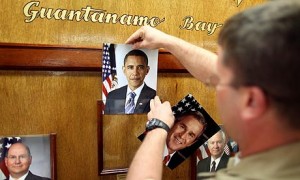Obama’s Record On Guantanamo Just As Shoddy As Bush’s
Lt. Col. Barry Wingard

During his 2008 campaign, President Obama promised the country “change we can believe in.” Yet, more than a year into his administration, he has delivered “more of the same” on issues pertaining to Guantanamo Bay. The island prison is still open, detainees still await trials, and officials have recommended the worst of George W. Bush’s policies — indefinite detention.
The Bush way of thinking seems to be the guiding force behind many of the administration’s decisions on terrorism and Guantanamo. Following the attempted Christmas Day bombing of a U.S. airliner, Obama administration officials decided to read the suspect his Miranda rights, claiming former President Bush would have done the same thing. I commend using our federal courts to try suspected terrorists, but I’m alarmed at how U.S. officials arrived at that decision.
If Obama’s invocation of Bush stopped there, I might cut him some slack. Unfortunately, the Bush mindset never left 1600 Pennsylvania Avenue along with its former inhabitant. Not long after taking office, Obama promptly revamped the conviction machine known as the military commissions, an alternative legal system that, as a presidential candidate, he had led us to believe he would abandon altogether in favor of federal trials.
The military commissions system is a second-tier justice system that is tolerant of flimsy evidence and uncorroborated hearsay by unnamed sources. Cases tried under the military commissions allow evidence that is unreliable or tainted by abuse. In fact, an internal Department of Defense review found that the case of my client, Kuwaiti detainee Fayiz Al Kandari, is “made up almost entirely of hearsay evidence recorded by unidentified individuals with no first-hand knowledge of the events they describe.”
This is evidence that would be laughed out of federal court in real criminal proceedings. Such multiple layers of hearsay introduced through highly redacted and secret documents, often from anonymous sources, is little more than rumor in the real world. In the commission system, however, a judge can find such statements based on the “totality of circumstance” not only admissible, but can base an entire case solely on their existence.
But it doesn’t stop there, either. As if kangaroo courts and their rules of evidence weren’t enough, the Obama administration is considering indefinite detention for some Guantanamo detainees, extending one of the Bush administration’s worst policies. In fact, a secret group known as the Guantanamo Detainee Review Task Force recently recommended approximately 50 detainees to be held indefinitely without trial, claiming these detainees are considered too dangerous to be released but too difficult to prosecute – even in the conviction-friendly military commission system.
Congress meanwhile has jumped on the bandwagon with legislation that, if passed, would make the recommendation of indefinite detention a reality. In early March, Senators John McCain (R-Arizona) and Joe Lieberman (I-Connecticut) introduced a bill that would allow the U.S. government to arrest so-called “enemy belligerents” and imprison them for years in military custody with no charges. Salon.com’s Glenn Greenwald has called the legislation “probably the single most extremist, tyrannical and dangerous bill introduced in the Senate in the last several decades.”
Now it is tempting to assume the decision to hold detainees indefinitely is based on a review of credible evidence. But if the evidence is so persuasive, why not introduce it in a public trial in a federal court of law and secure a legitimate conviction? And if the evidence is not reviewed by a court of law, who does review the evidence and determine the fates of individual suspects?
In these cases, evidence is classified and the identities of those making the determinations are closely guarded. This process is entirely secret and inherently un-American. A system that authorizes indefinite detention based on secret evidence can only result in distrust and suspicion much like the maligned Soviet system of years past. Remember two additional things: First, no one knows what the newly created laws of material support and conspiracy even mean. Secondly, it should not be unreasonable to believe that other countries will hold Americans under unclear laws, in secret proceedings, or in the alternative, indefinitely under no system at all if a secret group from that country deems it “necessary.”
It pains me to say that nothing has changed since Obama became President. In fact, people are questioning whether we can believe that any change will ever come. On February 5, 2008, Obama said, “change will not come if we wait for some other person or some other time.” He is right. We are not waiting for a new administration to bring about a false sense of hope. We are asking this administration to stand strong and bring the change it promised because it is right and not just a little better than before.
Lt. Col. Barry Wingard represents Fayiz al-Kandari, a Kuwaiti who has spent seven and a half years in U.S. custody at Guantanamo Bay without trial.
___________________________________________________________________________________
Source: http://pubrecord.org/commentary/7420/obamas-record-guantanamo-shoddy/print/
























